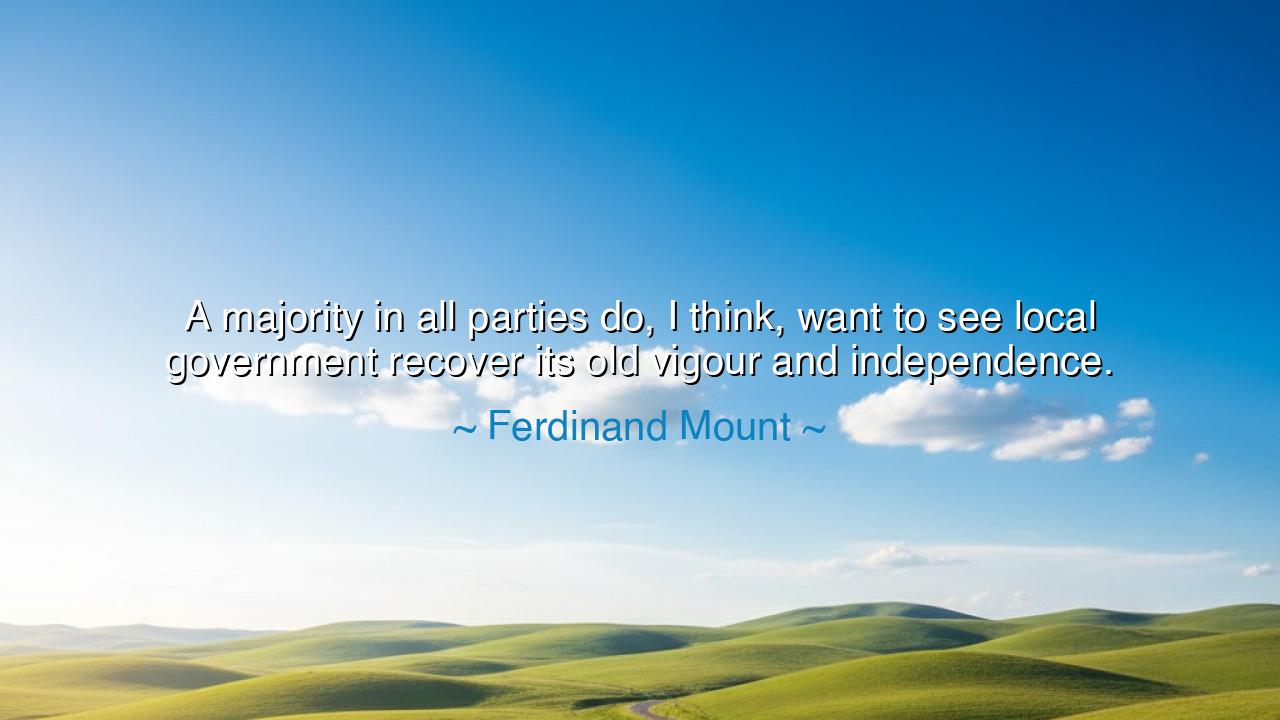
A majority in all parties do, I think, want to see local
A majority in all parties do, I think, want to see local government recover its old vigour and independence.






Hear now the words of Ferdinand Mount, a man who looked upon the shape of power and longed for balance: “A majority in all parties do, I think, want to see local government recover its old vigour and independence.” These are not the idle musings of a politician, but the lament of one who remembered an older England — an England where the spirit of local governance thrived, where town and parish were not mere servants of the distant capital, but living hearts of their own communities. His words are both hope and warning: hope that this independence might be revived, and warning that its loss has already weakened the roots of civic life.
In ancient times, the wise understood that power concentrated in one place, however noble its purpose, soon breeds decay. Independence was the strength of the polis, the lifeblood of self-rule. Mount’s cry for the recovery of local vigour echoes the wisdom of the ancients — of Athens, where the city’s citizens met face to face to debate their laws; of Rome, where the small republic was once strong because its people cared for their own affairs before reaching for empire. He reminds us that when governance grows too distant, it ceases to be governance at all; it becomes management, and the soul of community fades into silence.
The origin of Mount’s reflection lies in the long evolution of British government, where centuries of local self-rule — through parishes, boroughs, and county councils — once gave strength to the nation’s democracy. Over time, as the machinery of the state expanded, decisions once made by local hands were claimed by the central authority in London. Bureaucracy grew, and with it, dependence. Mount saw in this transformation not merely a change of policy, but a loss of vigour, a diminishing of that fierce, independent spirit which once animated the towns and shires of England. His words call upon leaders of every persuasion to restore that spirit, for without it, freedom itself grows brittle.
Think of the tale of the Italian city-states of the Renaissance — Florence, Venice, Siena — each one a living organism, ruled by its own citizens, cultivating art, commerce, and thought in dazzling measure. Their greatness sprang not from empires or kings, but from local independence, from citizens who saw themselves not as subjects but as stewards of their own fate. Yet when these cities were absorbed by greater powers, their brilliance dimmed. So too, Mount warns, will nations lose their creative force when local governance is suffocated by the weight of central control.
There is a profound moral truth here: a people cannot remain free if they forget how to govern themselves. When every decision comes from above, citizens grow passive; they cease to be participants and become mere observers. The vigour that Mount speaks of is not simply political — it is spiritual. It is the energy of a community that feels ownership of its destiny, the pride of a people who mend their own roads, govern their own schools, and care for their own poor. Independence, in this sense, is not isolation, but shared responsibility — the knowledge that freedom is not only a right, but a duty.
And yet, his words are not nostalgic but visionary. He does not dream of restoring the past, but of rekindling its spirit in a modern age. In every party, he says, there are those who still believe in this renewal — men and women who see that the greatness of a nation lies not only in its parliament or monarch, but in the strength of its local communities, the everyday acts of citizenship that give meaning to democracy. To recover this vigour, each generation must reclaim a portion of power for itself, not in rebellion, but in stewardship — in the noble art of self-government.
The lesson, then, is clear: do not wait for distant rulers to solve the problems that lie at your doorstep. Independence begins where you stand — in your town, your street, your school, your council. Be part of the life of your community, lend your voice to its decisions, and guard its freedom as you would guard your own. For when local government thrives, the nation stands tall; when it withers, all of democracy weakens.
So let Mount’s words ring as both remembrance and command: the vigour of a nation is born not in the halls of power, but in the hearts of its people. Let each of us strive to revive that independence — not through defiance, but through devotion, not through words, but through deeds. For when every village, town, and city becomes once more a living center of its own destiny, then and only then will a people know the fullness of their freedom.






AAdministratorAdministrator
Welcome, honored guests. Please leave a comment, we will respond soon